
 i_need_contribute
i_need_contribute
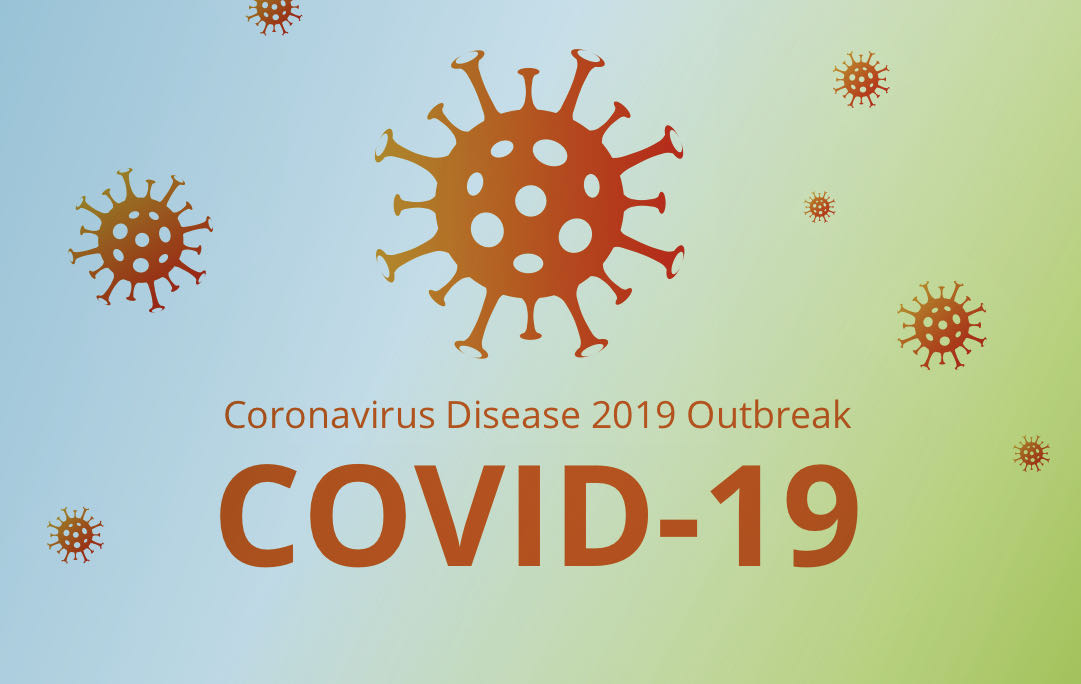
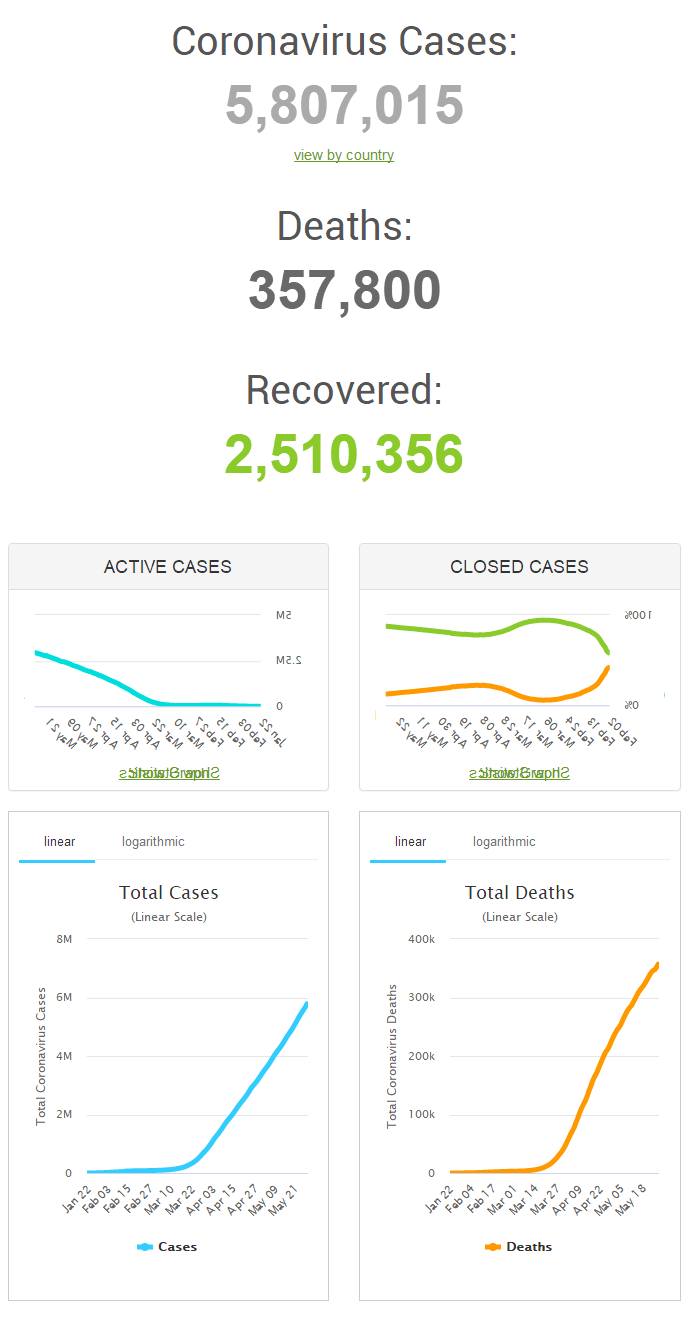
|
Country, |
Total |
New |
Total |
|
World |
5,784,603 |
+106,475 |
356,937 |
|
1,745,803 |
+20,546 |
102,107 |
|
|
414,661 |
+22,301 |
25,697 |
|
|
370,680 |
+8,338 |
3,968 |
|
|
283,849 |
+510 |
27,118 |
|
|
267,240 |
+2,013 |
37,460 |
|
|
231,139 |
+584 |
33,072 |
|
|
182,913 |
+191 |
28,596 |
|
|
181,895 |
+607 |
8,533 |
|
|
159,797 |
+1,035 |
4,431 |
|
|
158,086 |
+7,293 |
4,534 |
|
|
141,591 |
+2,080 |
7,564 |
|
|
135,905 |
+6,154 |
3,983 |
|
|
87,519 |
+872 |
6,765 |
|
|
82,993 |
+1 |
4,634 |
|
|
82,289 |
+4,328 |
841 |
|
|
78,541 |
+1,815 |
425 |
|
|
74,560 |
+3,455 |
8,134 |
|
|
59,151 |
+1,446 |
1,225 |
|
|
57,592 |
+137 |
9,364 |
|
|
48,947 |
+1,740 |
30 |
|
|
45,768 |
+190 |
5,871 |
|
|
38,956 |
+897 |
214 |
|
|
38,292 |
+1,541 |
544 |
|
|
38,103 |
+748 |
3,275 |
|
|
35,088 |
+648 |
4,220 |
|
|
32,876 |
+533 |
23 |
|
|
31,969 |
+883 |
255 |
|
|
31,292 |
+285 |
1,356 |
|
|
30,776 |
+15 |
1,917 |
|
|
25,937 |
+1,673 |
552 |
|
|
24,803 |
+68 |
1,631 |
|
|
24,104 |
+1,101 |
803 |
|
|
23,851 |
+686 |
1,473 |
|
|
23,267 |
+692 |
175 |
|
|
22,473 |
+399 |
1,028 |
|
|
21,905 |
+321 |
658 |
|
|
19,666 |
+910 |
816 |
|
|
18,594 |
+165 |
1,227 |
|
|
16,793 |
+36 |
281 |
|
|
16,651 |
+28 |
858 |
|
|
16,591 |
+34 |
645 |
|
|
15,723 |
+459 |
474 |
|
|
15,049 |
+380 |
904 |
|
|
13,933 |
+705 |
500 |
|
|
12,456 |
+625 |
227 |
|
|
11,728 |
+281 |
315 |
|
|
11,480 |
+52 |
565 |
|
|
11,275 |
+48 |
240 |
|
|
11,265 |
+40 |
269 |
|
|
9,692 |
+326 |
15 |
|
|
9,304 |
+335 |
37 |
|
|
9,086 |
+36 |
317 |
|
|
8,857 |
+160 |
623 |
|
|
8,733 |
+389 |
254 |
|
|
8,401 |
+18 |
235 |
|
|
8,373 |
+255 |
39 |
|
|
7,774 |
+372 |
98 |
|
|
7,619 |
+15 |
115 |
|
|
7,601 |
+24 |
202 |
|
|
7,537 |
+232 |
274 |
https://www.worldometers.info/coronavirus/

Police patrolling the Ourcq canal in Paris earlier this month.Credit...Andrea Mantovani for The New York Times
France on Wednesday revoked the authorization allowing hydroxychloroquine as a treatment for Covid-19 patients, a day after halting the use of the malaria drug in clinical trials. Both steps come on the back of moves by the World Health Organization to temporarily remove the drug from global trials over safety concerns.
In France, the drug was promoted as a miracle cure by a maverick infectious diseases specialist based in Marseille, Didier Raoult, who rose to prominence by conducting several questionable experiments that he said had proved the efficacy of hydroxychloroquine in combating the virus.
France had authorized limited use of the drug on patients in serious condition and had included it in several clinical trials. But now the country has joined the ranks of others moving away from the use of the drug, even after several prominent figures, including President Trump, have promoted it.
Mr. Trump has said he has taken hydroxychloroquine as a preventive measure, despite the lack of evidence that it works against Covid-19.

Shoppers observing social distancing while waiting to enter a reopened shop in Munich this month.Credit...Laetitia Vancon for The New York Times
When Chancellor Angela Merkel of Germany shut down her country to contain the pandemic in March, she had firm support from most citizens and each of Germany’s 16 state governors. When she announced a gradual reopening in April, it was harder to maintain that unity, but she pulled it off.
But a month later, the mood has shifted. Ms. Merkel is still wildly popular, but there are signs that her grip on the process of reviving public life in Europe’s biggest economy is slipping.
On Tuesday, her office negotiated an agreement between states that basic social-distancing measures should remain in place through June. A day later, she could barely contain her irritation with one of those governors, Bodo Ramelow of Thuringia, who had said he wanted to move away from “state coercion” to “individual responsibility.”
“The messages were a little ambiguous,” Ms. Merkel said of Mr. Ramelow’s remarks. “In my mind, the minimum distance is an obligation.”
Other governors have added their voices to the chorus calling for swift reopenings. The governor of Baden-Wurttemberg announced that he would allow events with up to 100 people starting next week. His counterpart in Hamburg promised that movie theaters, gyms and outdoor swimming pools would reopen within days.
Some of the political sparring is healthy federalism, spurring tailored responses to a pandemic that differs dramatically from region to region. But as a patchwork of wildly varying rules emerges within the country, contradictions have piled up, too. And that has fed discontent and conspiracy theories.
A small but noisy minority has been protesting the rules in cities across Germany each weekend. The protests have included members of Alternative for Germany and other far-right groups, which are trying to capitalize on the discontent as the country’s economic outlook darkens.

Sunrise in Milan. Italy would get the most aid under a proposed E.U. stimulus package .Credit...Alessandro Grassani for The New York Times
For decades, even when the 2008 financial crisis threatened to blow the bloc apart, the European Union’s wealthier nations resisted the notion of collective debt. But the coronavirus has so fundamentally damaged the European economy that it is now forcing leaders there to consider the sort of unified and sweeping response once thought unthinkable.
The European Commission, the bloc’s executive branch, on Wednesday proposed that it raise 750 billion euros, or $826 billion, on behalf of all members to finance recovery from the economic collapse, the worst crisis in the history of the European Union.
The plan, which still requires approval from the 27 national leaders and their parliaments, would be the first time that the bloc raised large amounts of common debt in capital markets, taking the E.U. one step closer to a shared budget, potentially paid for through common taxes.
For those reasons, the proposal had all the hallmarks of a historic moment for the E.U., vesting greater authority in Brussels in ways that would make it more closely than ever resemble a central government.
“This is about all of us and it is way bigger than any one of us,” Ursula von der Leyen, the Commission president, told European Parliament members in a speech in Brussels. “This is Europe’s moment.”
At another moment — one without a calamitous recession looming — the proposal would most likely have been dead on arrival, antagonizing populists and nationalists who oppose amassing power in Brussels. But the urgent need for a powerful response to the virus has muted much of the appeal of their message, at least for now.
With Britain gone, the calamity has forced Germany and France, the bloc’s two strongest countries and often at loggerheads, to step up in a rare display of joint leadership, paving the way for the commission’s proposal.

A library of coronavirus samples for gene sequencing at a University of Washington lab last month.Credit...Ruth Fremson/The New York Times
The first confirmed coronavirus infections in Europe and the United States, discovered in January, did not ignite the epidemics that followed, according to a close analysis of hundreds of viral genomes.
Those outbreaks began weeks later, the study concluded. The revised timeline may clarify nagging ambiguities about the arrival of the pandemic.
For example, while President Trump has frequently claimed that a ban in the U.S. on travelers from China prevented the epidemic from becoming much worse, the new data suggest that the virus that started Washington State’s epidemic arrived roughly two weeks after the ban was imposed on Feb. 2.
And the authors argue that the relatively late emergence of the outbreak means that more lives could have been saved by early action, such as testing and contact tracing.
The new analysis is not the last word. Scientific understanding of the coronavirus is evolving almost daily, and this type of research yields a range of possible results, not complete certainty.
But a number of virus experts said that the new report convincingly rules out a connection between the first confirmed cases and the later outbreaks.
“This paper clearly shows this didn’t happen,” said Kristian Andersen, a computational biologist at the Scripps Research Institute in San Diego, who was not involved in the research.
A preliminary version of the study was published online on Saturday. It has not yet been published in a scientific journal.
Source: https://www.nytimes.com/2020/05/27/world/coronavirus-world-global.html
From CNN's Zahra Ullah, Darya Tarasova and Matthew Chance in Moscow
Frontline medical workers in the US, UK and elsewhere may face major risks in their efforts to battle the coronavirus pandemic, but they've also seen an outpouring of public appreciation. In Russia, health workers say they face fear, mistrust -- even open hostility.
Tatyana Revva, an intensive care specialist in the city of Kalach-on-Don in southern Russia, shared a video in late March about equipment shortages with the Doctors Alliance, an advocacy group aligned with Russia's political opposition. After the video went viral, she said, she was summoned by local police.
"I was called to the police and gave a statement with a lawyer, but another statement against me was sent to the prosecutor's office," Revva told CNN via Skype after finishing a night shift.
Revva said law enforcement investigators subsequently checked the availability of PPE and ventilators at her hospital.
"But the check was carried out a month after I flagged the problems," she said. "You can imagine how much had been purchased in a month after the buzz the video made."
Revva says she has not been fined by police, but now fears professional retaliation.
Police have not responded to CNN's request for comment. The hospital administration could not immediately be reached for comment, but the hospital's chief doctor, Oleg Kumeiko, said in a March 29 statement on YouTube that the information posted online about PPE shortages was "absolutely untrue."
Rumors and conspiracy theories abound in Russia about Covid-19: that the virus was invented by doctors to control society; that medical workers are hiding the true extent of the casualties from the public; or that medical personnel are falsely attributing deaths to Covid-19 to receive more money from the government.
Analysis by CNN's Flora Charner, Shasta Darlington, Caitlin Hu and Taylor Barnes
That Brazil saw warning signs would be a dramatic understatement.
As Covid-19 raced across Europe, knocked the UK Prime Minister flat, and throttled New York City earlier this year, Brazil had plenty of notice that a catastrophe was on its way.
But was some of the danger drowned out by the megaphone of its bombastic President Jair Bolsonaro, who has repeatedly dismissed the virus as a "little flu"?
Brazil has now claimed the grim title of most Covid-19 cases globally after the US. More than 25,000 people in Brazil have died, and some experts say the toll could quintuple by August. Hospitals and graveyards alike are being stretched to their limits.
Around the world, citizens are asking their governments how local outbreaks spiraled out of control. But in Brazil, where the acting health minister is a military general with no health background, and the President personally attends anti-lockdown rallies, it's not clear who in the federal government might even deign to answer the question.
"What do you want me to do?" Bolsonaro asked reporters last month. "I'm not a miracle worker."
From CNN's Yoko Wakatsuki in Tokyo
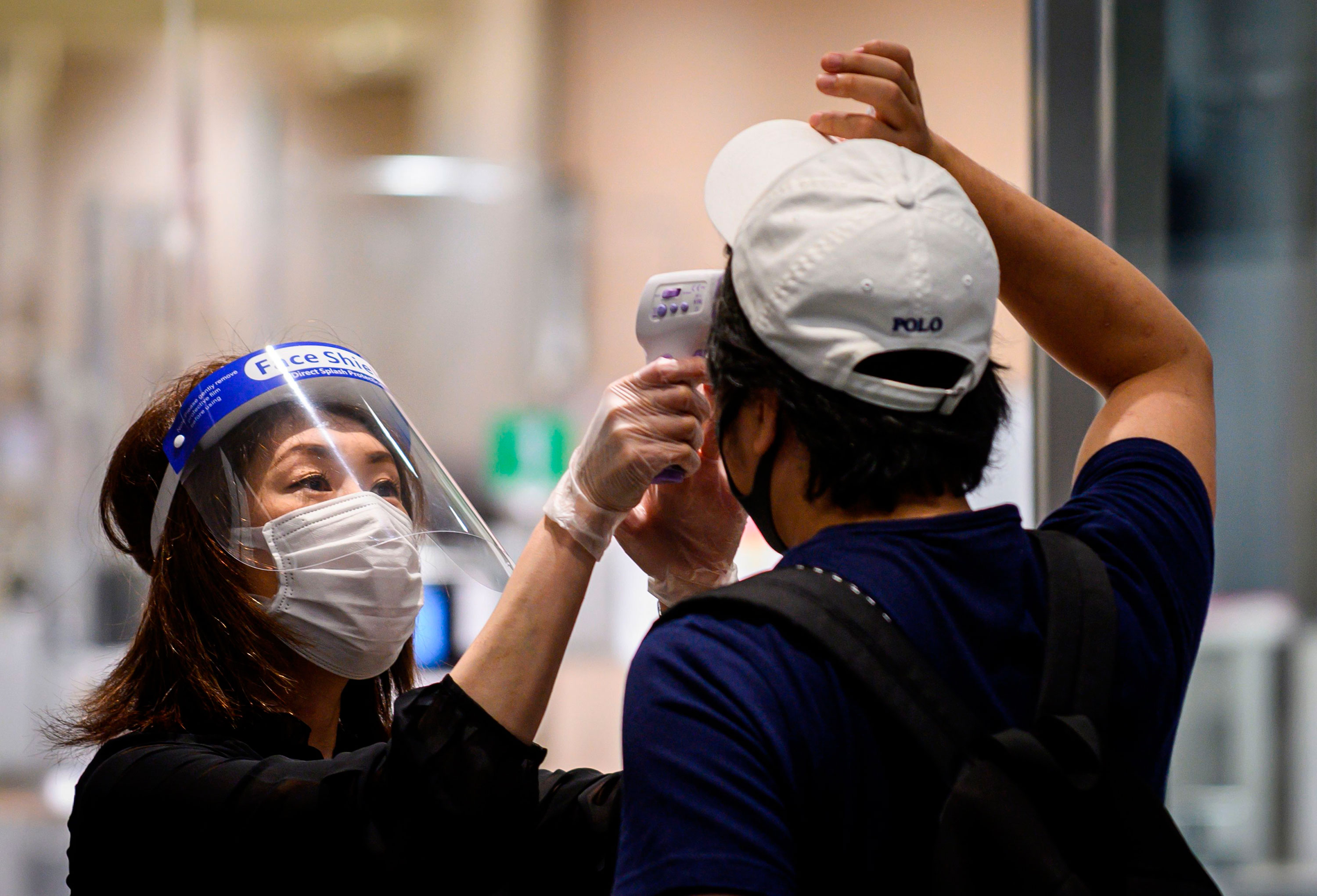
An employee conducts a temperature check on a customer at the entrance of the Shibuya Hikarie building in Tokyo on May 26. Behrouz Mehri/AFP/Getty Images
Japan’s Health Ministry said 41 new coronavirus cases and nine Covid-19 related deaths were reported in the country on Wednesday.
Tokyo reported 11 new infections and four deaths on Wednesday.
Concerning signs in the south: The mayor of the southern Japanese city of Kitakyushu, Kenji Kitahashi, warned a second wave could be coming, as public health authorities there are seeing a small rise in new cases. After more than three weeks of zero cases, 22 new patients have been identified in the last five days -- including eight on Wednesday.
"We will certainly be attacked by a huge second wave if it goes like this," Kitahashi said.
Japan's coronavirus breakdown:
17,395 cases since the outbreak began -- 16,683 on land and 712 tied to the Diamond Princess cruise ship
889 killed countrywide -- 876 on land and 13 in connection with the Diamond Princess
5,180 infections in Tokyo, as well as 296 deaths
From CNN’s Arman Azad
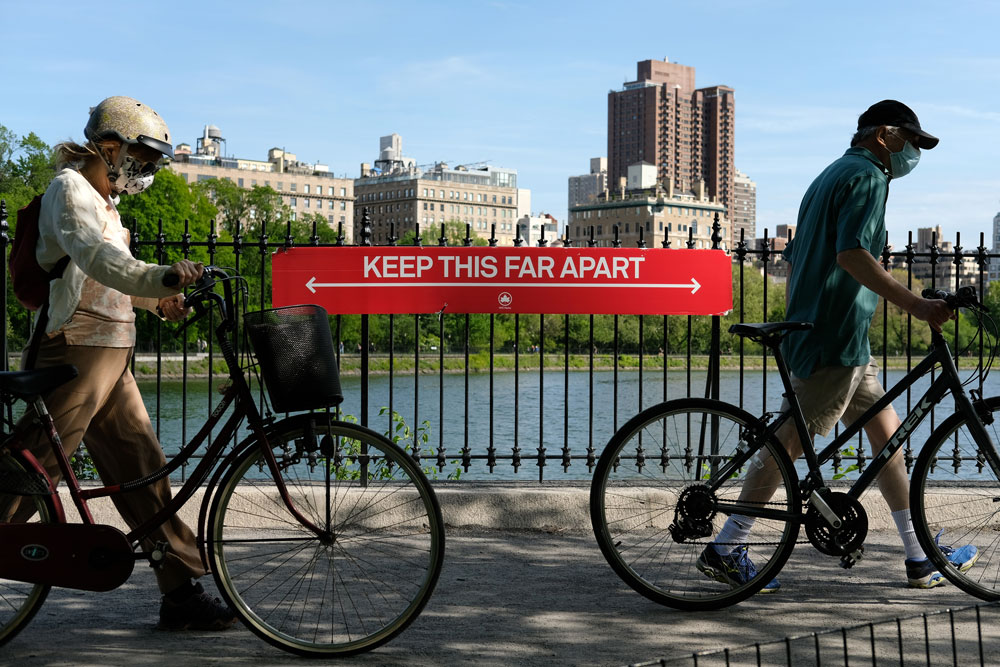
People wearing protective masks walk their bicycles past a social distancing sign at Jacqueline Kennedy Onassis Reservoir in Central Park during the coronavirus pandemic on May 17 in New York City. Dia Dipasupil/Getty Images
Public health officials have called on people to stay six feet apart to slow the spread of coronavirus through so-called respiratory droplets. But three experts are warning that six feet may not be enough – and they say the world needs to take airborne transmission of the virus seriously.
In a commentary published in the journal Science, the experts called for “regular, widespread testing” to find asymptomatic cases, and they pointed to places where mask wearing is universal and the virus has been controlled, like Hong Kong and Taiwan. World Health Organization guidance might not be enough in all situations, they said.
“Evidence suggests that (the novel coronavirus) is silently spreading in aerosols exhaled by highly contagious infected individuals with no symptoms,” wrote Chia Wang of National Sun Yat-sen University in Taiwan and Kimberly Prather and Dr. Robert Schooley of the University of California, San Diego.
“Increasing evidence for (the coronavirus) suggests the six foot WHO recommendation is likely not enough under many indoor conditions where aerosols can remain airborne for hours, accumulate over time, and follow air flows over distances further than six feet,” they wrote.
The three experts, who are specialists in chemistry and infectious diseases, said aerosols from breathing and speaking “can accumulate, remain infectious in indoor air for hours, and be easily inhaled deep into the lungs.” That makes wearing masks all the more essential, they said, even when people are keeping their distance.
More on this: The US Centers for Disease Control and Prevention has focused on so-called respiratory droplets produced when a person coughs or sneezes. The droplets don’t linger in the air for long, but the CDC says they “can land in the mouths or noses of people who are nearby or possibly be inhaled into the lungs.”
Spread is more likely when people are in close contact with one another, or “within about 6 feet,” the CDC says. That’s because respiratory droplets are relatively large and fall to the ground – unlike aerosols, which are smaller and more likely to stay in the air longer.
Despite the focus on droplets from US health officials and others, the experts said “a large proportion of the spread of coronavirus disease 2019 (Covid-19) appears to be occurring through airborne transmission of aerosols produced by asymptomatic individuals during breathing and speaking.”
While more research is needed, they called for robust testing schemes and said people need to mask up. “For society to resume, measures designed to reduce aerosol transmission must be implemented, including universal masking and regular, widespread testing to identify and isolate infected asymptomatic individuals,” they said.
From CNN's Jake Kwon in Seoul, South Korea
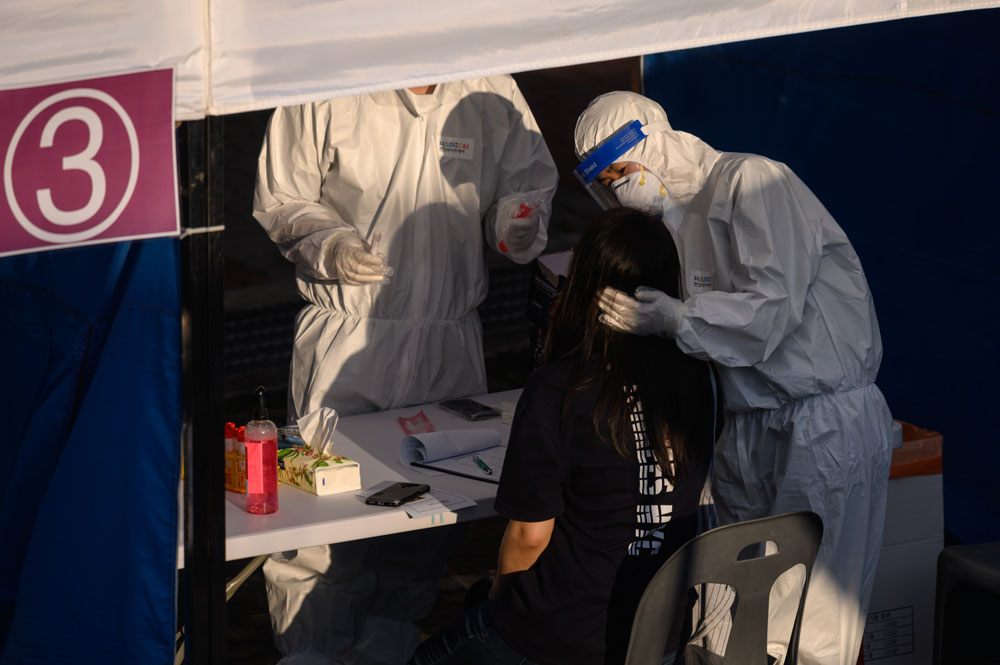
South Korean authorities identified 79 new novel coronavirus cases yesterday -- the most in a single day since April 5.
Sixty-eight of those were locally transmitted, with the majority found in Seoul, the province that surrounds the capital, Gyeonggi, and the city of Incheon.
Vice Health Minister Kim Gang-lip said that 54 of the patients identified Wednesday were traced to a logistics center in Bucheon, a satellite city 25 minutes from downtown Seoul. It's possible that the Bucheon cases are linked to a cluster identified in Itaewon, a popular nightlife district in Seoul, but the investigation is ongoing, an official at the Health Ministry said.
More than 4,150 people connected to the Bucheon cluster have been put under quarantine and 83% of them have been tested, Kim said. The rest will be tested today.
From CNN's Benjamin Berteau and Ya Chun Wang
Both chambers of the French Parliament voted overwhelmingly in favor of the StopCovid smartphone application on Wednesday, despite the contact tracing app being decried by opposition parties for its infringements on individual freedoms.
The vote was purely symbolic and was meant to let President Emmanuel Macron's government know there was political backing for the app. After hours of debate, StopCovid was adopted at the National Assembly with 338 votes in favor and 215 votes against. Around midnight, the French Senate voted in favor of the government app by 189 votes in favor to 129 against.
“StopCovid is a tool at the service of citizens and not a threat to their freedoms,” Justice Minister Nicole Belloubet told the Lower House.
The app had already been given the green light by the National Commission for Digital Freedom on Tuesday. A spokesperson for the National Assembly told CNN on Wednesday that the government "did not need a legal basis in order to deploy the app, because it works on a purely voluntary basis and doesn’t infringe on personal freedom."
French digital rights association La Quadrature du Net said that between 60% and 80% of the population would need to use the app for it to be useful in the fight against the coronavirus.
From CNN’s Al Goodman, Ingrid Formanek and Mia Alberti
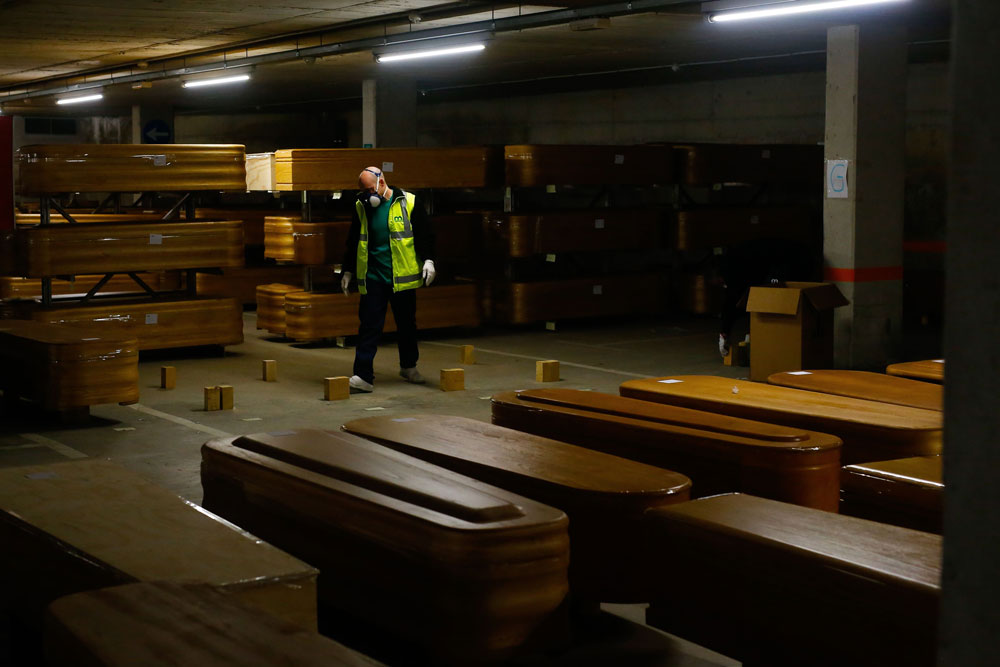
A mortuary worker prepares supports for coffins, most of them containing Covid-19 victims, at Collserola funeral home near Barcelona, Spain. Pau Barrena/AFP/Getty Images
Mortality rates in Spain were 55% higher than usual between March 10 and May 10, the country’s top coronavirus health ministry official said Wednesday.
“This excess of 55% represents more than 43,000 deaths than what is expected,” Fernando Simón, Spain’s director of the center for health emergencies, said. “That mortality was centered in people 75 or older,” accounting for 35,000 of the total excess figure.
However, only 27,118 of those additional deaths are linked to Covid-19. A “significant part” of the more than 43,000 deaths between March 10 and May 10 “cannot directly connect to Covid-19 yet,” cautioned Simón.
"If we count the deaths with coronavirus and compare it with the excess, there's still a significant number of deaths left that could be explained for several reasons," he added.
Among those reasons could be an inability or unwillingness to go to a hospital or get medical assistance during the peak of the coronavirus outbreak, Simón said.
“We may have also witnessed some complications in some health centers that didn't favor survival during a longer period for some of our elderly,” he added.
A number of senior care homes in Spain reported unusually high mortality numbers during the height of the pandemic, but most of the deceased were not tested for Covid-19.
The numbers are emerging now, Simón said, because the country was under strict lockdown during the height of the epidemic, and notifications of deaths may have been delayed due to registry workers not being able to go to their offices -- leaving many deaths tallied without a detailed analysis.
Source:https://edition.cnn.com/world/live-news/coronavirus-pandemic-05-28-20-intl/index.html
Known global cases near 5.7m. According to researchers at Johns Hopkins University, at least 5,693,066 people are known to have contracted the virus since the pandemic began, while at least 355,653 people are known to have died. The true death toll and number of cases are likely to be significantly higher due to differing definitions and testing rates, delays and suspected underreporting.
US deaths pass 100,000. Data from Johns Hopkins University shows that the United States has recorded more than 100,000 deaths from Covid-19, moving past a sombre milestone even as many states relax mitigation measures to stop the spread of the novel coronavirus. The US has recorded more deaths from the disease than any other country in the pandemic, and almost three times as many as the second-ranking country, Britain.
Trump silent on US death toll. Donald Trump remained silent on the death of more than 100,000 Americans from Covid-19 as the US mourned the milestone. The president made no comment on Twitter about the momentous day, but used the platform to attack tech companies for trying to censor him, a day after Twitter put a fact-check warning on one of his claims.
WHO launches foundation to put finances in better health. The World Health Organization on Wednesday launched a new foundation for private donations, as US President Donald Trump threatens to pull the plug over its handling of the Covid-19 pandemic, AFP reports.
South Korea could face return to coronavirus restrictions. South Korea has reported its biggest daily increase in coronavirus cases in 53 days, triggering warnings it may have to revert to stricter social distancing measures after appearing to have brought the outbreak under control.The Korean Centres for Disease Control and Prevention (KCDC) reported 79 new infections on Thursday with 67 of them from the Seoul metropolitan area, home to about half of the country’s population of 51 million.
UN: Virus could push 14 million into hunger in Latin America. The UN World Food Program is warning that at least 14 million people could go hungry in Latin America as the coronavirus pandemic rages on. New projections released late on Wednesday estimate a startling four-fold increase in severe food insecurity.
European investment slashed. Over a third of European foreign direct investment projects announced in 2019 have been either delayed or cancelled outright because of the coronavirus pandemic, an annual survey by professional services group EY found. Some 65% of the 6,412 projects in question are already in place or continuing “albeit with downgraded capacity and recruitment”, EY said. A further 25% were delayed and 10 percent cancelled, its Europe Attractiveness survey found.
Ireland faces record recession: think tank. Ireland is facing its deepest ever recession as the coronavirus lockdown devastates jobs and strains the public finances, a think tank said Thursday. A report by Ireland’s Economic and Social Research Institute predicts the nation’s gross domestic product (GDP) will decline 12.4% this year. That was the “most likely” scenario under a government plan to lift the lockdown in August but with the economy struggling to return to pre-pandemic levels owing to physical distancing measures, ESRI said.
Tory anger at Dominic Cummings builds. 61 Conservative MPs defied British PM Boris Johnson’s calls to “move on” from the Dominic Cummings crisis as a senior minister broke ranks to accuse the special adviser of inconsistencies in his account of his behaviour during lockdown. Former chancellor Sajid Javid also said the journey was not “necessary or justified” as the number of backbenchers calling for Cummings to resign or be sacked grew to 44, with more than 60 Tory MPs weighing in to criticise him. Two of those condemning Cummings are government whips.
Hydroxychloroquine study raises concerns. Questions have been raised about a study published in the Lancet that prompted the World Health Organization to halt global trials of the drug hydroxychloroquine. The Lancet said the authors were “investigating urgently” an apparent discrepancy in the data. It comes amid scientists’ concerns that rigorous standards are falling by the wayside in the race to understand the virus.